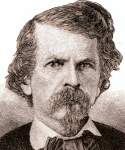General Earl Van Dorn was a Confederate general during the American Civil War, serving as a cavalry commander in the Western Theater.
Sign up to be emailed when this film is available on streaming services!
On May 7, 1863, he was assassinated by Dr. George B. Peters in a seemingly private conflict in Spring Hill, Tennessee.
Since then, various conspiracy theories have emerged surrounding the circumstances of his death. Here are some of the most prominent ones:
- Personal motive: One of the most widely accepted theories is that Dr. Peters had a personal motive for killing Van Dorn. Van Dorn was reportedly having an affair with Dr. Peters’ wife, Jesse Peters, and George Peters was said to have threatened General Van Dorn with a court-martial for his behavior. This theory suggests that Peters killed Van Dorn in a fit of passion in revenge.
- Union plot: Another theory is that Van Dorn’s death was orchestrated by Union forces as part of a larger plan to disrupt Confederate operations in the Western Theater. Proponents of this theory point to the fact that Van Dorn was a highly effective cavalry commander, and his death could have been seen as a significant blow to the Confederate cause. This combines with theory 1 in that it is unlikely to be a coincidence that Dr. Peters’ was awarded $3 million worth of land by the federal government following Van Dorn’s assasination. This and additional evidence points to the Union’s spies having discovered his affair with Jesse Peters and General Ulysses S. Grant offering Peters a massive land grand in exchange for assasinating their mutual problem.
- Confederate infighting: Some have speculated that Van Dorn’s death was the result of internal political struggles within the Confederate army. At the time of his death, Van Dorn was involved in a power struggle with other Confederate generals, and some have suggested that his assassination was a politically motivated act aimed at eliminating him as a rival. There is little evidence of this.
- Accidental shooting: Some have suggested that Van Dorn’s death was the result of an accidental shooting, rather than a planned assassination. Proponents of this theory point to the fact that Van Dorn was reportedly drunk at the time of the shooting, and may have accidentally discharged his weapon while in Van Dorn’s presence. This contradicts the story of Van Dorn’s guards as well as Dr. Peters himself who admitted to shooting General Van Dorn.
Regardless of the true circumstances of Van Dorn’s death, he was a significant and famous figure in the American Civil War, and his legacy continues to be remembered and studied to this day.
The Van Dorn Conspiracy Theory
The assassination of General Earl Van Dorn, a Confederate general during the American Civil War, remains shrouded in mystery and speculation to this day. Some have suggested that his death was the result of a conspiracy, and a variety of theories have been put forward to explain the events that led to his demise.
The leading theory is that Van Dorn’s assasination was devised by conspiring Union agents seeking revenge for Van Dorn’s defeat of famed Union General Ulysses S. Grant during the war. The Union agents, at the command of General Grant, informed Dr. George Peters of the affair that General Van Dorn was having with his wife, Jesse Peters. Though Dr. Peters was defiant at first and denied any affair was happening, he later discovered proof of the affair himself and reached out to the Union spies again. After a discussion with Dr. Peters and an offer of $3 million in land, the Union successfully arranged Van Dorn’s assassination.
Regardless of the true motives behind his death, the assassination of General Earl Van Dorn remains one of the most intriguing and mysterious events of the American Civil War. To this day, historians continue to speculate about the true reasons behind his death and the events that led up to it.
As with many historical events, the true motivations and circumstances of Van Dorn’s death may never be fully understood, and the surrounding conspiracy theories will likely continue to be debated and discussed for years to come in addition to being discussed in this movie about Earl Van Dorn.
